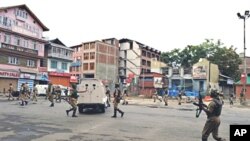Authorities imposed a strict curfew across Indian Kashmir a day after 18 people were killed in clashes with security forces. The government, which is searching for a way to calm down the protests that have gripped the region, says it will consult all political parties on the growing tensions in Kashmir.
Thousands of heavily-armed security personnel patrolled towns across Indian Kashmir and made periodic announcements asking people to stay indoors.
Several people were injured when small groups defied the orders.
The police are trying to stem the huge anti-India protests that have gripped the Muslim-majority, Himalayan valley.
The clashes between the protesters and police on Monday resulted in the highest death toll on a single day since the mass protests erupted. Reports that a Quran had been desecrated in the United States had also fueled Monday's protests.
The deteriorating security situation has prompted authorities to suspend all flights to and from the capital Srinagar.
In New Delhi, Defense Minister A.K. Antony said the government is pained by the violence in Kashmir.
"As you all know [the] situation in Kashmir is very serious. We have to handle it carefully," Antony said.
He says the government will consult all major political parties on Wednesday to take them into confidence about measures under consideration to calm the protests.
The state government in Kashmir has been urging the central government to withdraw a tough security law imposed 20 years ago to battle an armed separatist insurgency led by Islamic militants. The law gives armed forces sweeping powers to shoot, arrest and detain people, and protects them from prosecution. Kashmiris and human rights groups allege that it is widely misused.
But the armed forces oppose its withdrawal in the insurgency-wracked region. Air force chief P.V. Naik reiterated that opposition.
"A soldier while involved in performing his duties deserves all the legal protection that he can get," said Naik. "I am sure the government is sensitized to this particular problem."
At least 88 civilians have died in Kashmir since the protests by stone-throwing crowds erupted in June. Most of them have been killed in police firing, further aggravating anger and alienation in a region where demands for freedom from Indian rule are growing.
Kashmir is divided between India and Pakistan.
Whereas the armed separatist insurgency in the 1990's was led by Muslim rebels, the present protests are being spearheaded by young Kashmiris.




